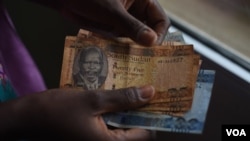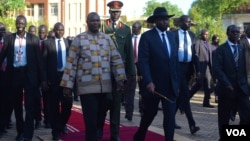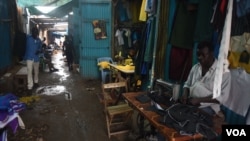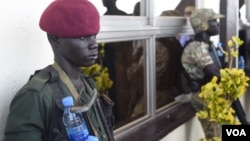Two and a half years of civil war have destroyed South Sudan’s economy. The country's leaders now say they need urgent international support to rebuild the country and restore peace.
When South Sudan gained independence in 2011, its oil wealth made its government one of the richest in East Africa. But now, after more than two years of war, it is among the poorest.
Fighting has cut oil production in half, while crude prices worldwide have collapsed. The South Sudanese pound has lost almost 90 percent of its value, and inflation is skyrocketing.
President Salva Kiir and former rebel leader Riek Machar are meant to form a transitional government this week aimed at ending the war. But there is not enough money to keep the new government going.
‘Abnormal conditions’
Professor Marial Awou, an economics professor at the University of Juba, says the new government will need direct budget support to stay afloat.
"We are in extraordinary conditions, abnormal conditions. Under normal conditions you will leave the country to take care of its budget, but we are coming out of the war, we are settling people, we are setting up institutions, so it needs abnormal resources," Awou said.
Kiir and Machar are asking the international community, including the International Monetary Fund, to help with such resources. Whether budget support arrives depends partly on the decision of foreign donors like the United States, Britain, and Norway. Those three countries say they will support the transitional government, but they are wary of corruption and funds being used to fuel more fighting.
In the last two years, South Sudan slashed its health and education budgets while spending massively on weapons. Doctors are on strike because they haven't been paid in months. Public clinics have no medicine.
Big changes, controls needed
British Ambassador to South Sudan Tim Morris said foreign donors need to see big changes in how the country's finances are managed.
"If this country is to attract a substantive international package, it has to implement policies of reform, otherwise the IMF, the international financial community simply cannot engage," Morris said.
Morris added there will be no lump sums of cash given, and any spending must be tightly controlled. He warned that for now, Britain will not support the military, South Sudan's largest employer, given human rights abuses during the war. Morris also cautioned that foreign nations are stretched insofar as how much money they can spend on South Sudan.
"Funds are very limited globally. This is not just a question of a figure being identified and satisfied. It is a question of a process, and it will be a period of austerity and my prediction, I think all our predictions, is that the transitional government will have a difficult job in this," Morris said.
Some optimism, some skepticism
South Sudan's finance minister, David Deng Athorbei, said he is confident the government will enact the reforms and win support.
"The international community, especially the IMF and the World Bank, are ready to come and to plan programs for South Sudan. This of course is based on a number of conditions, but those conditions are good for us because all of us aspire to implement those conditions they look for," Athorbei said.
Yet South Sudanese economist Peter Biar Ajak is skeptical the country's politicians will do a better job managing finances this time around. He said the IMF may require an austerity budget that cuts spending by 50 percent. But he added that South Sudan's public wage bill is actually expanding as Machar's politicians, generals, and soldiers rejoin the government and army.
"I don't see that political strength that will say ‘let's cut expenditures, let's reduce the military, let's cut off the corruption.’ I don't see that happening," Ajak said.
Whether or not Kiir and Machar prove Ajak wrong may determine whether their new partnership succeeds or fails.







